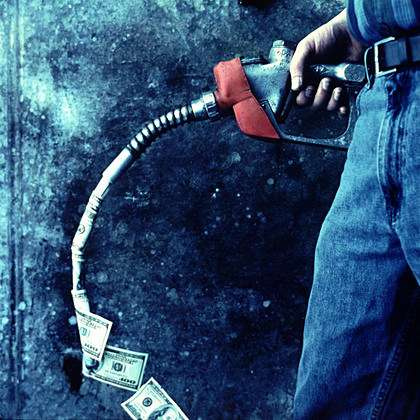What Obama Electricity Tax? (Washington Post)
The Cost of Oil Subsidies
The Cost of Oil Subsidies (NY Times – Editorial)
GM Cuts SUV, Truck Production, Citing Low Demand
GM Cuts SUV, Truck Production, Citing Low Demand (NY Times)
Funds for Highways Plummet as Drivers Cut Gasoline Use
Funds for Highways Plummet as Drivers Cut Gasoline Use (Wall Street Journal)
Fuel Subsidies Overseas Take a Toll on U.S.
Fuel Subsidies Overseas Take a Toll on U.S. (NY Times)
B.C. Carbon Tax Backlash: How Real?
 For months we’ve been touting the British Columbia carbon tax, and for good reason. Not only is BC’s carbon tax the highest by far in North America ($10 per metric ton of CO2 this year, rising stepwise to $30 in 2012), but the rollout of the tax has seemed to be handled with great intelligence. The Liberal Party provincial administration took pains to make the tax revenue-neutral (mostly via reductions in personal and business tax rates), a feature it underscored by sending B.C. residents $100 carbon tax dividend checks as a down payment in the week before the tax went into effect on July 1.
For months we’ve been touting the British Columbia carbon tax, and for good reason. Not only is BC’s carbon tax the highest by far in North America ($10 per metric ton of CO2 this year, rising stepwise to $30 in 2012), but the rollout of the tax has seemed to be handled with great intelligence. The Liberal Party provincial administration took pains to make the tax revenue-neutral (mostly via reductions in personal and business tax rates), a feature it underscored by sending B.C. residents $100 carbon tax dividend checks as a down payment in the week before the tax went into effect on July 1.
So we were dismayed to read in mid-July of a poll showing a clear majority of B.C.’ers opposed to the tax. Even the $100 dividends came off badly in the poll, with at least one respondent complaining that her check only served to remind her of the loathsome tax.
Columnist Bill Tieleman, who posted the story on the Vancouver Web outlet 24 hours, drives home the point in a later story, Carbon tax has no supporters around here. Tieleman seems to fancy himself as a populist voice against B.C. premier Gordon Campbell in general and the tax in particular.
Over the weekend we discussed the poll with social entrepreneur Peter Barnes, progenitor of the intriguing Cap-and-Dividend approach to revenue-neutral carbon pricing, as follows:
Komanoff:
- Much is made of Americans’ supposed sensitivity to gasoline prices, and the same may be applying in B.C., exacerbated of course by the "market-based" rise in pump prices which has been an order of magnitude greater than the (9 cent a gallon) carbon tax. Mathematically, each of those $100 checks covers the carbon tax on 1,111 gallons, though the true coverage is less considering that gasoline accounts for only ~35% of the carbon tax bite in BC (21-22% in the U.S.). Needless to say, most BC’ers don’t consume 1,100 gallons of gas a year.
- Most likely the BC government could have done more and better p.r. Yet overall they’ve been savvy … consider if the $100 checks had lagged rather than preceded the rollout of the tax!
- The poll question wasn’t straight-up, since it suggested that the $100 check was all that BC’ers would get, when it’s actually just the down payment. Here’s that Q: "The provincial government has sent every British Columbian a cheque for $100 as a one-time ‘Climate Action Dividend.’ The total cost of ‘Climate Action Dividend’ is $440 million. This expenditure will
be paid for by B.C.’s new carbon tax of 2.4 cents per litre of gasoline and other fuel. Do you agree or disagree with this expenditure?" - One always wants to know how the poll respondents were selected. (Recall the notorious Literary Digest poll picking Landon over FDR in ’36!) Still, this isn’t to deny that even the dividend concept which you’ve been so prolific and persuasive in disseminating is an uphill fight.
Barnes:
- One problem (from a PR standpoint) might be that the BC tax cuts are divided between individuals and businesses. So even if there is overall revenue neutrality, most voters will only get back about half of what they pay in higher prices.
- The way in which tax cuts rise along with carbon prices is not transparent or seemingly automatic. The carbon tax revenue is not placed in a separate trust fund (so far as I can tell) but is blended with general revenue. It is then up to future legislatures to adjust the tax rates. This could reasonably make people skeptical.
- A one-time dividend is an obvious gimmick. Recurring (and rising) dividends are likely to create more credibility.
- This goes to the heart of the question of whether to return carbon revenue via tax credits or dividends, which is something Obama will have to decide.
Peter concludes: "The British Columbia experience suggests that segregating carbon revenue in a trust fund and returning all of it to individuals through automatic monthly dividends (as James Hansen and others have proposed) is the best way to sustain political support." We at CTC heartily agree.
Photo: Flickr / bbboon
Policies Pose as Pro-Market
Policies Pose as Pro-Market (Marketplace – American Public Media)
EPA: Voluntary Pollution-Reduction Programs Won't Accomplish Much
EPA: Voluntary Pollution-Reduction Programs Won’t Accomplish Much (Hartford Courant)
Gas Conservation Threatens Road Funding
Gas Conservation Threatens Road Funding (WSJ)
No Gas Tax Holiday: Congress Considers Raising Pump Tax to Help Repair Crumbling Highways
No Gas Tax Holiday: Congress Considers Raising Pump Tax to Help Repair Crumbling Highways (Chicago Tribune)
- « Previous Page
- 1
- …
- 144
- 145
- 146
- 147
- 148
- …
- 170
- Next Page »
